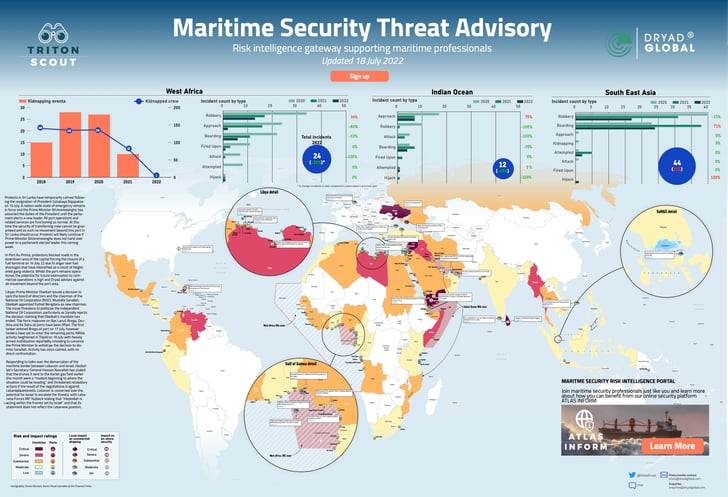Access the latest Triton Scout Maritime Security Threat Advisory for the week commencing 18th July 2022
👉 Protests in Sri Lanka have temporarily calmed following the resignation of President Gotabaya Rajapakse on 15 July. A nation-wide state of emergency remains in force and the Prime Minister Wickremesinghe has assumed the duties of the President until the parliament elects a new leader. All port operations and related services are functioning as normal. At this time the security of transferring crew cannot be guaranteed and as such no movement beyond this port in Sri Lanka should occur. Protests will likely continue if Prime Minister Wickremesinghe does not hand over power to a parliament elected leader this coming week.
👉 In Port Au Prince, protestors blocked roads in the downtown area of the capital forcing the closure of a fuel terminal on 14 July 22 due to anger over fuel shortages that have intensified as a result of heightened gang violence. Whilst the port remains operational, the potential for future interruption to commercial operations is high and Dryad advises against all movement beyond the port area.
👉 Libyan Prime Minister Dbeibah issued a decision to sack the board of directors and the chairman of the National Oil Corporation (NOC), Mustafa Sanallah. Dbeibah appointed Farhat Bengdara as new chairman. The move threatens to politicise the independent National Oil Corporation, particularly as Sanalla rejects the decision claiming that Dbeibah’s mandate has ended. The force majeures on Ras Lanuf, Brega, Zeuitina and As Sidra oil ports have been lifted. The first tanker entered Brega oil port on 17 July, however tankers have yet to enter the remaining ports. Militia activity heightened in Tripoli on 16 July with heavily armed mobilisation reportedly intending to convince the Prime Minister to withdraw the decision to dismiss Sanallah. Activity has since calmed, with no direct confrontation.
👉 Responding to talks over the demarcation of the maritime border between Lebanon and Israel, Hezbol- lah’s Secretary-General Hassan Nasrallah has stated that the drones it sent to the Karish gas field earlier this month were a “modest beginning to where the situation could be heading” and threatened retaliatory actions if the result of the negotiations is against Lebanon’s interests.Lebanon is concerned over the potential for Israel to escalate the threats, with Lebanese Forces MP Yazbeck stating that “Hezbollah is acting within the frames set by Israel” and that its statement does not reflect the Lebanese position.
👉 Understand the maritime security implications of these incidents on the region and access the latest intelligence reports and security updates for the rest of the world by clicking on the image below:



.jpg)


